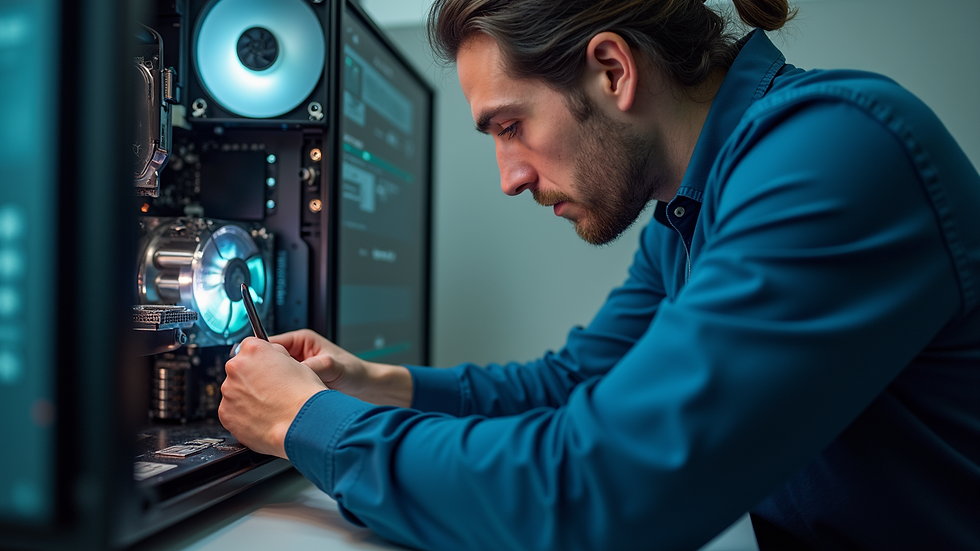Preventative Steps to Avoid Computer Failures
- Aditya Prabhu
- Aug 24, 2025
- 3 min read
Computers have become an integral part of our daily lives, whether for work, study, or entertainment. However, like any machine, they are prone to failures if not properly maintained. Preventing computer failures is not just about avoiding inconvenience but also about protecting your valuable data and saving money on costly repairs. This article will guide you through practical and effective preventative steps to keep your computer running smoothly and extend its lifespan.
Understanding the Importance of Computer Maintenance
Regular computer maintenance is crucial to ensure optimal performance and prevent unexpected breakdowns. Many users overlook simple upkeep tasks, which can lead to hardware malfunctions, software issues, and data loss. By dedicating a little time to maintenance, you can avoid these problems and enjoy a faster, more reliable computer.
Key Benefits of Computer Maintenance
Improved performance: Regular cleaning and updates help your computer run faster.
Extended lifespan: Proper care reduces wear and tear on components.
Data protection: Backups and security measures prevent data loss.
Cost savings: Avoid expensive repairs by catching issues early.

Essential Computer Maintenance Practices
To prevent computer failures, it is important to adopt a routine that covers both hardware and software aspects. Here are some essential maintenance practices you should follow:
1. Keep Your Computer Physically Clean
Dust and debris can accumulate inside your computer, causing overheating and hardware damage. Clean your computer regularly by:
Using compressed air to blow out dust from vents, fans, and internal components.
Wiping the exterior with a soft, dry cloth.
Ensuring your workspace is free from excessive dust.
2. Monitor and Manage Software Health
Software issues can slow down your computer or cause crashes. Maintain software health by:
Installing updates for your operating system and applications promptly.
Running antivirus scans regularly to detect and remove malware.
Uninstalling unused programs to free up space and reduce conflicts.
Using disk cleanup tools to remove temporary files and optimize storage.
3. Backup Your Data Frequently
Data loss can occur due to hardware failure, malware, or accidental deletion. Protect your important files by:
Using cloud storage services for automatic backups.
Creating regular backups on external drives.
Verifying backup integrity to ensure files can be restored.
4. Monitor Hardware Health
Keep an eye on your computer’s hardware status to catch problems early:
Use diagnostic tools to check hard drive health and memory status.
Listen for unusual noises from fans or hard drives.
Check system temperatures with monitoring software to prevent overheating.
5. Use a Surge Protector
Power surges can damage your computer’s internal components. Protect your device by:
Plugging it into a reliable surge protector.
Avoiding direct connection to wall outlets without protection.
Considering an uninterruptible power supply (UPS) for critical systems.
Is PC Repair Worth It?
When your computer starts showing signs of failure, you might wonder whether repairing it is worthwhile or if it’s better to replace it. The answer depends on several factors:
Cost vs. Value
Age of the computer: Older machines may not be worth expensive repairs.
Type of problem: Simple fixes like replacing a hard drive or upgrading RAM are often cost-effective.
Performance needs: If your computer no longer meets your requirements, investing in a new one might be better.
Data Recovery Importance
If your computer contains critical data, repairing it to recover files can be invaluable. In such cases, professional help is recommended.
Professional Repair Services
Sometimes, DIY fixes can cause more harm than good. Seeking a trusted computer repair service ensures expert diagnosis and repair, saving time and preventing further damage.

Additional Tips to Prevent Computer Failures
Beyond regular maintenance, consider these extra tips to safeguard your computer:
Avoid Overloading: Don’t run too many programs simultaneously, which can strain your system.
Keep Software Licensed: Use genuine software to avoid malware risks.
Regularly Restart Your Computer: This helps clear temporary files and refresh system resources.
Use Strong Passwords: Protect your system from unauthorized access.
Stay Informed: Keep up with the latest security threats and software updates.
When to Seek Professional Help
Despite your best efforts, some issues require professional attention. Signs you should contact a specialist include:
Persistent hardware failures like frequent crashes or blue screens.
Strange noises from your computer.
Inability to boot or access important files.
Complex software errors or malware infections.
Professional technicians can provide thorough diagnostics and repairs, ensuring your computer is restored safely and efficiently.
By following these preventative steps and maintaining your computer regularly, you can avoid many common failures and enjoy a reliable, efficient device for years to come. Taking care of your computer today means fewer headaches and expenses tomorrow.




Comments